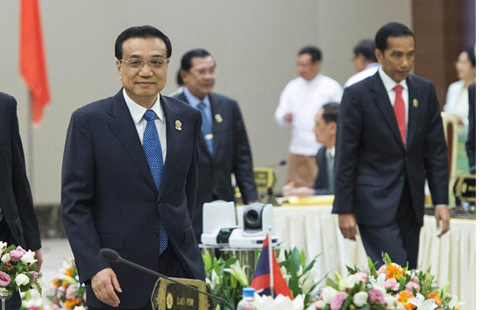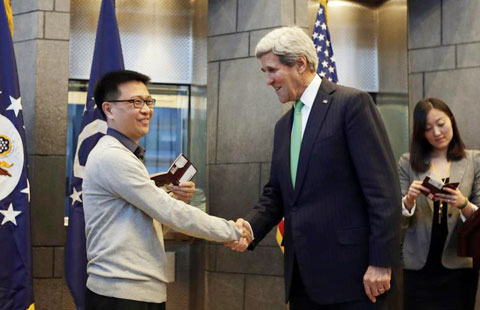US-China climate pact will pressure other countries: Experts
Updated: 2014-11-13 06:46
By AMY HE in New York and LAN LAN in Beijing(China Daily USA)
|
||||||||
The joint pledge by China and the United States to cut greenhouse gas emissions will pressure other countries to match the agreement when they meet at the United Nations' climate talks in Paris next year, said climate-change experts.
"The announcement puts additional momentum behind that meeting," said Thomas Lorenzen, a former assistant chief at the Environment and Natural Resources Division of the US Justice Department. "The fact that two of the world's largest emitters of greenhouses are now on the record as being in agreement that they will take steps to tackle this puts additional pressure on other countries to also take those steps."
Elliott Diringer, executive vice-president of the Center for Climate and Energy Solutions said that the announcement "underscores the necessity of a new international agreement. It will definitely provide stronger incentive for other countries to come forward next year with their own contributions to the Paris agreement. To have the leaders of the world's two largest economies and largest carbon emitters stepping up together to put forward serious commitments will certainly encourage others to do the same."
Despite the Paris talks being over a year away, "announcing targets this early - rather than holding out until the last possible minute when all cards were on the table - is extremely constructive," said Joanna Lewis, associate professor of Chinese energy and environment at Georgetown University. "Hopefully it will motivate other nations to follow suit."
UN Secretary-General Ban Ki-moon called the joint statement issued by China and the US "an important contribution" to a possible global climate-change agreement in Paris next year. "China and the United States have demonstrated the leadership that the world expects of them," Ban said in a statement.
China intends to peak its carbon dioxide emissions by around 2030 and will make its best efforts to do so early, according to the joint announcement made by presidents Xi Jinping and Barack Obama in Beijing on Wednesday.
It's the first time that China has set a time frame to cap its emissions. The nation also committed to increasing its share of non-fossil fuel energy to about 20 percent by 2030.
At the same time, Obama announced a new target to cut US greenhouse gas emissions between 26 to 28 percent below 2005 levels by 2025, a step forward from its previous pledge to cut emissions by 17 percent by 2020 from 2005 levels.
"The climate announcements by the United States and China mark a major departure from previous climate targets for both countries. Both countries had been hinting at what their next round of climate targets would look like for several months, so I think the timing was more of a surprise than the content of the agreement," said Lewis of Georgetown University.
Lewis said that China's announcement to achieve peak carbon dioxide emissions by around 2030 is a more "ambitious" scenario, given that recent US-China studies have predicted that baseline CO2 peaks could be reached in the 2035-2040 time frame, with the more accelerated scenario falling in the 2025-2030 range.
The two countries recognized that these actions are part of the long-term effort to transition to low-carbon economies, mindful of the global temperature goal of 2 degrees Celsius, according to the joint announcement.
"The two countries are committed to reaching an ambitious 2015 agreement that reflects the principle of common but differentiated responsibilities and respective capabilities, in light of different national circumstances," the countries said.
Other climate experts said it was historic to have the leaders of the world's two largest economies stand shoulder-to-shoulder and make significant commitments to curb emissions.
Zou Ji, deputy director of the National Center for Climate Change Strategy and International Cooperation, a think tank, said the joint announcement was a "significant and constructive" outcome that resulted from nearly six months' dialogue between the two countries.
"What's more important than the specific targets is that China and US, the world's largest developed country and developing country, have move toward a more clear, firm and pragmatic direction in addressing climate change," said Zou.
Fred Krupp, president of the Environmental Defense Fund, a US nonprofit environmental advocacy group, said this level of cooperation between the two largest emitting nations is essential.
"But more leadership will be needed. The focus between now and the Paris meeting should be to ensure that commitments from the US, China and all countries are equal to the urgency and magnitude of the problem," Krupp said.
China and the US are also two of the world's largest investors in clean energy. The two countries have cooperated on launching initiatives on vehicles, smart grids and greenhouse gas data management.
Fu Jing in Brussels contributed to this story.

 Lang Lang honored with German award
Lang Lang honored with German award
 Premier Li attends the 9th East Asia Summit
Premier Li attends the 9th East Asia Summit
 Airshow China soars to success in Zhuhai
Airshow China soars to success in Zhuhai
 The most people dine on the beds
The most people dine on the beds
 Dangling workers rescued from World Trade Center
Dangling workers rescued from World Trade Center
 Long-term visas issued for China, US citizens
Long-term visas issued for China, US citizens
 Long-term visas issued for China, US citizens
Long-term visas issued for China, US citizens
 Culture Insider: Chic items in ancient China
Culture Insider: Chic items in ancient China
Most Viewed
Editor's Picks

|

|

|

|

|

|
Today's Top News
Chinese company, US farm coop to build milk-powder plant in Kansas
China, ASEAN set goal for upgrading FTA
Country pushes for code at South China Sea
Beijing wants to keep 'APEC blue'
The Waldorf's hefty price tag
US, China reach landmark pacts
Youth urged to get politically involved
Rick Snyder seeks to woo China trade, giant pandas
US Weekly

|

|








